
The punk subculture includes a diverse and widely known array of ideologies, fashion, and other forms of expression, visual art, dance, literature, and film. Largely characterised by anti-establishment views, the promotion of individual freedom, and the DIY ethics, the culture originated from punk rock.
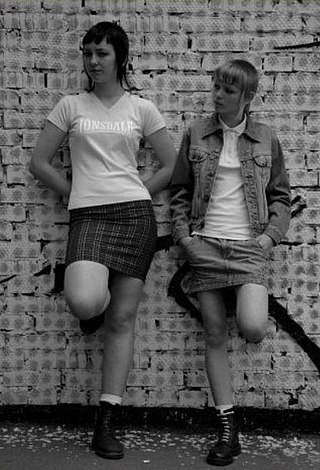
A skinhead or skin is a member of a subculture that originated among working-class youths in London, England, in the 1960s. It soon spread to other parts of the United Kingdom, with a second working-class skinhead movement emerging worldwide in the late 1970s. Motivated by social alienation and working-class solidarity, skinheads are defined by their close-cropped or shaven heads and working-class clothing such as Dr. Martens and steel toe work boots, braces, high rise and varying length straight-leg jeans, and button-down collar shirts, usually slim fitting in check or plain. The movement reached a peak at the end of the 1960s, experienced a revival in the 1980s, and, since then, has endured in multiple contexts worldwide.
Emo is a music genre characterized by emotional, often confessional lyrics. It emerged as a style of hardcore punk and post-hardcore from the mid-1980s Washington, D.C. hardcore scene, where it was known as emotional hardcore or emocore. The bands Rites of Spring and Embrace, among others, pioneered the genre. In the early-to-mid 1990s, emo was adopted and reinvented by alternative rock, indie rock, punk rock, and pop-punk bands, including Sunny Day Real Estate, Jawbreaker, Cap'n Jazz, and Jimmy Eat World. By the mid-1990s, Braid, the Promise Ring, and the Get Up Kids emerged from Midwest emo, and several independent record labels began to specialize in the genre. Meanwhile, screamo, a more aggressive style of emo using screamed vocals, also emerged, pioneered by the San Diego bands Heroin and Antioch Arrow. Screamo achieved mainstream success in the 2000s with bands like Hawthorne Heights, Silverstein, Story of the Year, Thursday, the Used, and Underoath.
Gothic rock is a style of rock music that emerged from post-punk in the United Kingdom in the late 1970s. The first post-punk bands which shifted toward dark music with gothic overtones include Siouxsie and the Banshees, Joy Division, Bauhaus, and the Cure.
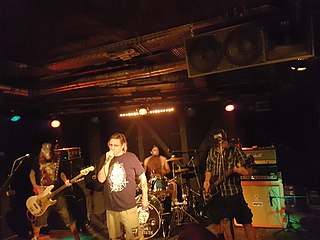
MDC is an American punk rock band formed in 1979 in Austin, Texas, subsequently based in San Francisco, and currently Portland, Oregon. Among the first wave of bands to define the sound and style of American hardcore punk, MDC originally formed as The Stains; they have periodically changed the meaning of "MDC", the most frequent being Millions of Dead Cops. The band's lyrical content expresses radical left political views and has proven influential within the punk subculture.
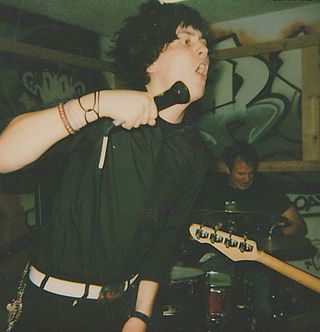
Screamo is an aggressive subgenre of emo that emerged in the early 1990s and emphasizes "willfully experimental dissonance and dynamics". San Diego-based bands Heroin and Antioch Arrow pioneered the genre in the early 1990s, and it was developed in the late 1990s mainly by bands from the East Coast of the United States such as Pg. 99, Orchid, Saetia, and I Hate Myself. Screamo is strongly influenced by hardcore punk and characterized by the use of screamed vocals. Lyrical themes usually include emotional pain, death, romance, and human rights. The term "screamo" has frequently been mistaken as referring to any music with screaming.
Angelic Upstarts are an English punk rock / Oi! band formed in South Shields in 1977. AllMusic calls them "one of the period's most politically charged and thought-provoking groups". The band espouse an anti-fascist and socialist working class philosophy, and have been associated with the punk and skinhead subcultures.

Crust punk is a subgenre of punk rock influenced by the English punk scene as well as extreme metal. The style, which evolved in the early 1980s in England, often has songs with dark and pessimistic lyrics that linger on political and social ills. The term "crust" was coined by Hellbastard on their 1986 Ripper Crust demo.
Extreme metal is a loosely defined umbrella term for a number of related heavy metal music subgenres that have developed since the early 1980s. It has been defined as a "cluster of metal subgenres characterized by sonic, verbal, and visual transgression".

Drive Like Jehu was an American post-hardcore band from San Diego active from 1990 to 1995 and later from 2014 to 2016. It was formed by rhythm guitarist and vocalist Rick Froberg and lead guitarist John Reis, ex-members of Pitchfork, along with bassist Mike Kennedy and drummer Mark Trombino, both from Night Soil Man, after their two bands disbanded in 1990. Drive Like Jehu's music was characterized by passionate singing, unusual song structure, indirect melodic themes, intricate guitar playing, and calculated use of tension, resulting in a distinctive sound amongst other post-hardcore acts and helped to catalyze the evolution of hardcore punk into emo.

Punk ideologies are a group of varied social and political beliefs associated with the punk subculture and punk rock. It is primarily concerned with concepts such as mutual aid, against selling out, hierarchy, white supremacy, authoritarianism, eugenics, class and classism, while supporting anti-consumerism, anti-corporatism, anti-war, anti-imperialism, leftism, anti-globalization, anti-gentrification, anti-racism, anti-sexism, gender equality, anti-homophobia, racial equality, animal rights, free-thought and non-conformity. One of its main tenets is a rejection of mainstream, corporate mass culture and its values. It continues to evolve its ideology as the movement spreads throughout North America from its origins in England and New York and embraces a range of anti-racist and anti-sexist belief systems. Punk does not necessarily lend itself to any particular political ideology as it is primarily anti-establishment although leftist punk is more common due to the prevalence of liberal and conservative ideologies in the status-quo.
White power skinheads, also known as racist skinheads and neo-Nazi skinheads, are members of a neo-Nazi, white supremacist and antisemitic offshoot of the skinhead subculture. Many of them are affiliated with white nationalist organizations and some of them are members of prison gangs. The movement emerged in the United Kingdom between the late 1960s and the late 1970s, before spreading across Eurasia and North America in the 1980–1990s.

Nicholas Joseph Zinner is the guitarist and record producer for the New York rock band Yeah Yeah Yeahs. Zinner is also a photographer.

Nazi chic is the use of style, imagery, and paraphernalia in clothing and popular culture related to Nazi-era Germany, especially when used for taboo-breaking or shock value rather than out of genuine support of Nazism or Nazi ideology.

The Plot to Blow Up the Eiffel Tower was an American four-piece noise rock/post-hardcore band from San Diego, California, United States, that formed in 2001. After disbanding in 2006, drummer Brian Hill now plays with The Soft Pack, while singer Brandon Welchez and Charles Rowell formed the duo Crocodiles.

Justin Pearson is an American musician and record label owner, known for being the vocalist and bassist in a number of San Diego-based noise rock, punk and grindcore bands, as well as running his record label Three One G Records. Starting off in the punk outfit Struggle in 1994, ensuing projects such as Swing Kids, The Locust, Dead Cross and Retox. He has collaborated with Kool Keith, Gabe Serbian, Karen O, Nick Zinner, Adam Gnade, Invisibl Skratch Piklz, Asia Argento, The Bloody Beetroots, Silent, among many others.
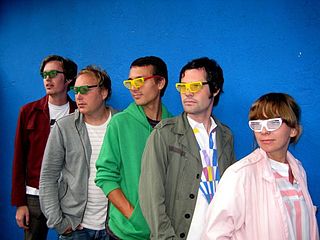
Love Is All is a Swedish five-piece indie pop band from Gothenburg. It releases songs in English. Paste Magazine has stated that it makes "infectiously lo-fi punk rock laced with saxophone and melodic vocals". Their most acclaimed single, "Make out fall out make up" is included among Pitchfork's 200 best songs of 2000s.

The history of the punk subculture involves the history of punk rock, the history of various punk ideologies, punk fashion, punk visual art, punk literature, dance, and punk film. Since emerging in the United States, the United Kingdom and Australia in the mid-1970s, the punk subculture has spread around the globe and evolved into a number of different forms. The history of punk plays an important part in the history of subcultures in the 20th century.
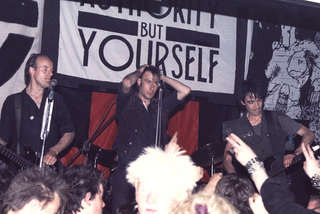
Crass were an English art collective and punk rock band formed in Epping, Essex in 1977, who promoted anarchism as a political ideology, a way of life, and a resistance movement. Crass popularised the anarcho-punk movement of the punk subculture, advocating direct action, animal rights, feminism, anti-fascism, and environmentalism. The band used and advocated a DIY ethic in its albums, sound collages, leaflets, and films.

Women have made significant contributions to punk rock music and its subculture since its inception in the 1970s. In contrast to the rock music and heavy metal scenes of the 1970s, which were dominated by men, the anarchic, counter-cultural mindset of the punk scene in mid-and-late 1970s encouraged women to participate. This participation played a role in the historical development of punk music, especially in the US and UK at that time, and continues to influence and enable future generations. Women have participated in the punk scene as lead singers, instrumentalists, as all-female bands, zine contributors and fashion designers.















